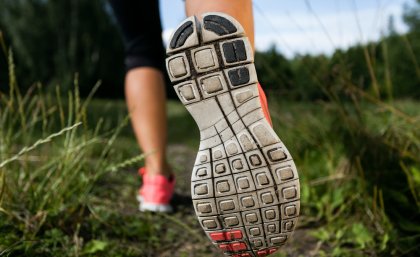
Don’t underestimate the intelligence of your foot.
A study led by Dr Luke Kelly of The University of Queensland’s School of Human Movement and Nutrition Sciences has explored the intimate relationships between our feet and running shoes.
“We really wanted to understand how feet move inside shoes and the influence this has on how the brain and spinal cord control the function of the foot,” Dr Kelly said.
“The overarching question was: ‘Do running shoes interfere with your body’s ability to control foot and leg muscle function?’.
“We found the arch of your foot collapses less when you run in shoes, making your foot stiffer.”
However, according to Dr Kelly, the most fascinating finding was that the increase in stiffness was not due to the support features of the shoe, but instead due to an increase in the activation of the muscles supporting the arch.
“This is somewhat counter-intuitive and in contrast to suggestions made by evolutionary biologists that running shoes block sensory feedback from the feet and weaken foot muscles,” he said.
“The findings further highlighted the highly adaptable nature of the human foot and the many unseen things it does to get us from point A to point B.”
Dr Kelly said he believed the changes occurred due to the softness of the shoes and the brain counter-acting by increasing the force produced by the muscles of the arch.
“Similar mechanisms are known to occur at the knee and ankle, but this is the first time we’ve observed it in the foot,” he said.
Dr Kelly and collaborators Professor Andrew Cresswell, Associate Professor Glen Lichtwark and Dr Dominic Farris observed 16 participants as they each took two turns running on a treadmill.
One of their runs was performed wearing sneakers, while their other run was completed barefoot.
Runners’ longitudinal arches collapsed by around 25 per cent less when shoes were worn.
“We confirm that running shoes do indeed influence the mechanical function of the foot, however the underlying mechanism may be quite different from that of common belief,” Dr Kelly said.
“Our findings suggest the alterations in foot function that occur when running in shoes are likely to have occurred as a result of increased muscle activation, rather than by impairment.”
The findings of the UQ research team, partially funded by Asics Oceania Pty Ltd, have been published in the Journal of the Royal Society.
Dr Kelly is an NHMRC Early Career Research Fellow. He has been the biomechanics consultant to Cricket Australia since 2013 and a sports podiatrist since 2004.
Media: Dr Luke Kelly, l.kelly3@uq.edu.au, +67 3365 6240; Robert Burgin, UQ Communications, r.burgin@uq.edu.au, +61 7 3346 3035, +61 448 410 364.
.jpg)










